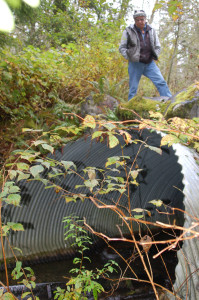
U.S. 9th District Court of Appeals rules in favor of the tribes in culvert case
By Kalvin Valdillez, Tulalip News
A culvert is a tunnel carrying a stream or open drain under a road or railroad. Currently, there are hundreds of culverts in the state of Washington that are in need of repairs. This issue has been an on-going problem for the tribes of Washington State for a large amount of time. The reason this is an issue for northwest Native Americans is because the blocked culverts are preventing salmon from swimming into spawning areas and from swimming back to the ocean, thus diminishing the salmon runs in Washington.
The original case began over 15 years ago; in 2001 the 21 federally recognized tribes of Washington filed a complaint against Washington State in the U.S. District Court regarding the damaged culverts. In 2007 the court ruled that building the culverts put the state in violation of the treaties the state signed with the tribes, and in 2013 the court made it a requirement for the Department of Transportation to replace the culverts with more efficient and salmon friendly culverts. The court gave Washington 17 years to replace the culverts making this the second victory for the tribes regarding this issue.
Washington State found this ruling a bit harsh and filed an appeal stating that the ruling was too expensive. The estimate given by The Department of Transportation was around $1.9 billion for the replacement of approximately 800 estimated culverts over the next 17 years. The court did find these estimations to be over-calculated for both the cost as well as the number of culverts that need to be replaced.
Washington agrees that blocked culverts are one reason why salmon runs are on the decline. The state corrected 23 culverts since the ruling in 2013, and looks to fix several more before the year ends. However, the state did file the appeal claiming that the treaties did not require the state to restore the salmon habitat, there is no minimum requirement of salmon for the tribes, and that the project is too time consuming and expensive. The states appeal was heard in October of 2015.
On Monday June 27, 2016 the U.S. 9th District Court of Appeals ruled yet again in favor of the tribes. The state can still file for a rehearing and petition for the U.S. Supreme Court. Washington State attorneys are currently reviewing the case and deciding whether or not they would like to proceed with a rehearing,
Once the culverts are replaced they will open over 1,000 miles of streams for salmon to pass through. Tribal leaders are looking to Washington for a sit-down to create a co-management plan that is financially realistic as well as time efficient. The decision is definitely a sign of progress for the recovery of the salmon habitat. However, many believe that there is still much work to be done, citing the culverts as just one of many problems. John Sledd, the primary attorney for the tribes believes that this is a major step in the right direction.
“Treaty fishing rights mean nothing without fish to catch, and you can’t have fish if they can’t get to their habitat to reproduce. The Court of Appeals made it absolutely clear – the treaties promised the tribes more than the right to set their nets and bring them up empty. They promised enough fish to meet the people’s needs. This decision is a big step to fulfilling that promise. It’s a great decision for the tribes, the fish, and everyone who values wild salmon.”
